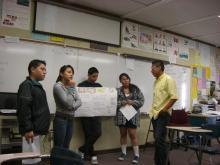Foundations in Criminal Justice
Foundations in Criminal Justice provides students with a broad overview of the criminal and juvenile justice systems. Students learn about historical developments and current practices in criminal law, corrections, and the courts. Throughout the course, they explore the meaning of crime and justice, and the relationship between criminal justice and social justice.
Students examine course material through several lenses:
- Philosophical and Historical: Theoretical foundations of the legal system, and purposes and justifications of laws and social contracts.
- Power and Fairness: How the law and legal systems can be used both to protect and oppress. The balance of different kinds of power within society is also explored.
- U.S. Law and Law Enforcement: How laws are created, enforced, and interpreted. The relationship between law and public policy at the federal, state and local levels of government are also studied.
- Advocacy and Policy: How individuals and groups, including young people, can take action to reform our legal system.
- Career Exploration: What career paths exist in the legal and criminal justice systems, and how the pursuit of a particular profession can serve as a form of civic action.
- Comparative Systems: How the U.S. legal system compares with legal and political systems, philosophies, and practices of other countries.
“We actually got to do [a] case and be involved in it rather than just reading about it. It gave me a very realistic experience of our justice system and how it works.” H.S. Student
Essential Questions
- What is crime? Who defines it?
- What are the functions of a criminal justice system?
- How do criminal justice systems balance the safety of the community with the need to protect individual rights?
- What are the different roles, responsibilities, and limits of professions in the criminal and juvenile justice systems?
- How do criminal and juvenile justice systems affect young people, and how can they work to improve the administration of justice in their communities?
Course Sequence
- Unit 1: There Ought to Be a Law! Defining Crime and Justice
- Unit 2: Responses to Crime
- Unit 3: Presumed Innocent: Jury Trials and the Pursuit of Justice
- Unit 4: Youth Justice: Exploring the Juvenile Justice System
- Unit 5: Punishment and Rehabilitation in the Criminal Justice System
- Unit 6: Engaging Youth in the Law: Current Issues in Criminal Justice

